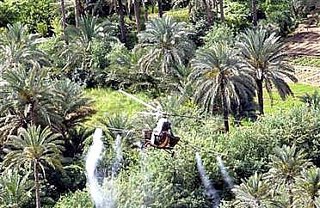Analysis: Effort to revive ancient date industry holds promise for Iraq's economy
 Dust cropping date palms in Iraq
Dust cropping date palms in IraqBAQUBAH, Iraq -- Inside the festival hall, on long tables covered with white cloth, Aboud Ahdim Abbas Mohammad saw a glimpse of the future: baskets filled with different kinds of ripe, delicious dates. They held the twin promise of reviving an ancient industry and Iraq's devastated economy.
But once outside, Mohammad wondered whether Iraq would ever realize such aspirations. Violence had emptied nearby villages filled with date farmers. His cousins had been slain on the way to sell their harvest. Gunmen had recently ambushed him. He shot his way out to safety, but not before a bullet rammed into his left arm.
"They don't want a new Iraq based on freedom and a country that produces," said Mohammad, 56, who looked regal with bronzed skin, a pepper gray moustache and a white and black checkered tribal head scarf.
Across a volatile landscape brimming with militias and insurgents, farmers like Mohammad are trying to restore the glory days when Iraq produced about 30 percent of the world's supply of dates. The fruit has been a symbol of daily life since the time of the civilizations of Babylon and Sumer, more than 5,000 years ago.
In the calculus of preventing Iraq's slide toward civil war, reconstructing Iraq's economy is a top priority. And dates are Iraq's second-biggest export, after oil. Revitalizing the industry could help reduce sectarian tensions by creating thousands of jobs while generating revenue to rebuild Iraq, improve security and lessen the country's dependence on U.S. reconstruction dollars.
Read the rest at the Washington Post

<< Home